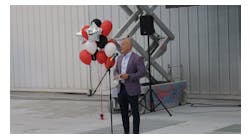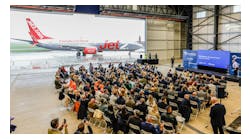Manpower – an Achilles’ heel for Indonesian aviation?
In the end of August 2013, an MRO subsidiary of Lion Air, the largest privately owned airline in Indonesia, revealed its plans to establish a new MRO centre on a Batam island, which is only about 30 km away from the major aviation hub - Singapore. The latest plans reflect yet another Indonesia’s attempt to become the leading player in the Asia Pacific region. But despite its eagerness and drive, it seems that the local industry might just end up following the steps of China, which had to pacify the ambitions of its carriers due to the shortage of manpower.
Being the world’s largest archipelago state, Indonesia comprises over 17,500 islands populated by almost 240 million people. With no major changes in the economy and the current annual GDP growth staying at approx. 5.9-6%, the country’s consuming class is to double by the end of the decade. According to Boston Consulting Group, over 140 million of Indonesians will be considered as belonging to the middle class by 2020. That is almost twice as many as the current 74 million.
“Today Indonesia serves 70 million air passengers per year. Courtesy of the strong economic development of the country, more and more of its people are able to afford both domestic and international air transportation. The overall Indonesian passenger traffic is expected to almost triple in the following decade. In a few years Indonesia will be amongst the TOP10 countries with the largest air travel markets,” comments Kestutis Volungevicius, the Head of FL Technics Training.
Meanwhile, local airlines are eagerly placing new orders. Garuda Indonesia, the flag carrier of Indonesia, along with its subsidiaries is anticipating over 110 new aircraft to reach its fleet in the following several years. Its main competitor, a privately owned Lion Air is expecting even larger deliveries. According to CAPA reports, by the end of 2013 Garuda’s and Lion Air’s fleets will already include 139 and 145 aircraft, respectively, thus making the two carriers the largest in the Asia Pacific region.
Another factor contributing to the extending national fleet is the rapid development of local businesses and private aviation. According to Forbes, Indonesia has over 30 dollar billionaires while the TOP40 wealthiest Indonesians hold over $86 billion worth of assets. Geographical peculiarities of the country trigger the demand for corporate air transportation between islands as well as across the entire region. Local market players estimate that the annual delivery of business jets in Indonesia is worth around $300-500 million.
Along with the expanding fleet the local industry will definitely require proper infrastructure to satisfy the demand for MRO support. However, due to the lack of experience and qualified staff until only recently the absolute majority of MRO works had been conducted outside the country. It is being estimated that by the end of the previous decade only approx. one third of the entire MRO services was rendered by local companies. But in the past several years the situation started to change.
“Without any doubt, rising oil prices have largely contributed to the fact that Indonesian carriers are increasingly seeking for ways to service their aircraft at home. And there are no obvious signs that the trend should change any time soon. The uncertainty over Syria, continuing unrest in Egypt and strikes in other neighbouring countries – all of these factors affect the entire Middle East. During the past 5 weeks jet fuel prices have risen by over 5%, and there is no certainty that the prices will go down any time soon. This is also one of the trends which support the development of local MRO industry,” explained the Head of FL Technics Training.
At the same time, Indonesian aviation is still suffering from the shortage of qualified specialists. European aviation authorities remain concerned with the Indonesian Directorate General of Civil Aviation's (DGCA) ability to ensure proper supervision of local airlines and their compliance with safety standards. This results in the fact that Lion Air along with several other Indonesian carriers is still being banned from the European airspace.
“Unfortunately, while the number of both orders and deliveries are rising, Indonesia is rapidly approaching the point at which it won’t have the capabilities required to maintain its enlarging fleet. On the one hand, there is an obvious issue of infrastructure underdevelopment which limits business development and the expansion of the private aviation sector. On the other hand, the ongoing shortage of qualified manpower means that under current circumstances even the best facilities could not be staffed properly. This concerns not only pilots, but technical personnel as well.
“In 2011 there were over 30 accidents. Same as in many other countries, a large number of those accidents were caused by a human factor. The only way to improve the situation is to provide additional training which would meet international standards. With regard to the MRO segment, it is being estimated that the current shortage of qualified personnel reaches approx. 1500-2000 specialists. These figures do not include the training which must be conducted for the existing generation of technical personnel who are currently working for MROs, airlines and aviation authorities,” says Kestutis Volungevicius.
The shortage of manpower affects local airlines in several ways. First of all, they are forced to send some of their fleet outside of the country thus increasing their operational costs and aircraft downtime. At the same time, the lack of qualified instructors and certified MRO specialists doesn’t allow local carriers to exit the EU’s ban list. Such limitations, along with the ICAO’s concerns about the local CAA, not only lower the competitiveness of the entire Indonesian aviation, but also affect the financing of new aircraft as finance institutions consider such factors to constitute additional risks which raise interest rates and lease payments.
“Over the past several years Indonesia made a considerable progress with regard to aviation safety. However, there is still more to be done in order for the industry to meet all of the international standards and principles. Indonesian aviation players should put additional effort into attracting EASA or FAA licensed personnel who would guide the industry and assist it in making final improvements towards meeting the relevant ICAO recommendations. And they should act fast. After the ASEAN open skies agreement will come into force in 2015, some Indonesian carriers might find it difficult to compete with other airlines from the region which have achieved lower operational costs and risks,” concluded the Head of FL Technics Training.
About FL Technics Training
FL Technics Training is a provider of technical training for the aviation industry. The company offers comprehensive training services including basic training and examination, aircraft type training and specialized training for aircraft maintenance technicians as well as administrative and management personnel. FL Technics Training is part of an integrated aircraft maintenance and repair organization (MRO) FL Technics.
Based in Vilnius, Lithuania, FL Technics Training is certified as a European Aviation Safety Agency (EASA) Part-147 training organization providing courses for basic, aircraft type training and customized training programs designed according to individual client requirements. The company serves a wide range of customers from Europe and the CIS (Poland, Romania, Ukraine, Moldova, Russian Federation etc.), Asia-Pacific (including South Korea, Pakistan, Kazakhstan, Tajikistan, and etc.), Africa, Cuba and other regions.
Drawn up in accordance with the requirements of the EASA, FL Technics Training programmes cover four areas: basic training, aircraft type training, specialized aviation training and consulting services. FL Technics Training offers training for diverse aircraft types: Airbus A318/A319/A320/A321, Airbus A380/340/330, ATR 42 - 200/300, ATR 72 - 100/200, Boeing 737 - 300/400/500, Boeing 737 - 600/700/800/900, Boeing 757 - 200, Boeing 767 - 200/300, Boeing 747/777/767, Saab – 340, Saab – 2000, Bombardier CL-600-2B19.
FL Technics Training offers specialized training programs of general interest for technical as well as administrative personnel from Engineering and Planning, Quality system, EASA Regulation Part-145 and Part-M to Fuel Tank Safety courses. Training programs can be adapted to meet the specific needs and requirements of clients.
More than 3,000 students for over 45.000 hours per year are trained at the company's theoretical courses in Moscow, Tyumen, Alma Ata, Vilnius and London. Training on the job is executed in Vilnius, Kiev and London.
For further information visit website http://www.fltechnicstraining.com/.



